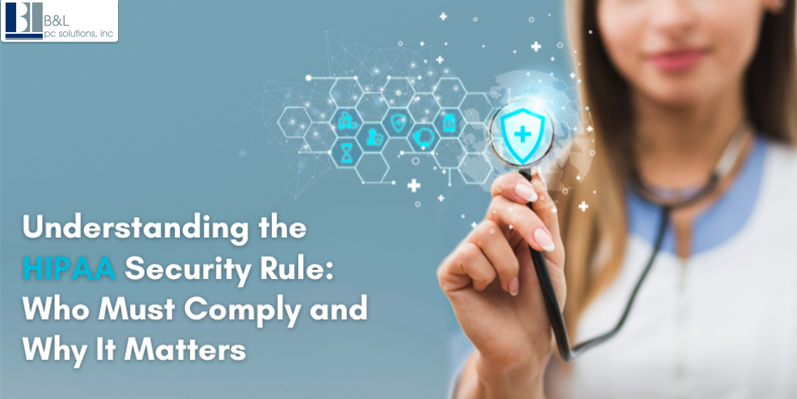
The health industry is full of data, and that data should be maintained. That’s the reason HIPAA (Health Insurance Portability and Accountability Act) came into action for security rules. This is an important rule that requires the protection of electronic protected health information (ePHI) when it comes to data security. In order to safeguard ePHI developed, obtained, utilized, or maintained by protected entities and their business connections, it sets national standards.
Who Needs to Follow the HIPAA Security Rule?
Business associates and covered entities are the two basic categories of companies to whom the HIPAA Security Rule applies.
Covered Entities
Covered entities are groups that immediately handle PHI and include:
- Health Care Providers: Such as medical doctors, clinics, psychologists, dentists, chiropractors, nursing homes, and pharmacies, but only if they transmit any data in digital form about a transaction for which HHS has adopted a well known.
- Health Plans: Including health insurance businesses, HMOs, business health plans, and authorities programs that pay for healthcare, such as Medicare and Medicaid.
- Health Care Clearinghouses: This is all about the entities who obtain the complete info from another entity and process the non-standard health data into a great layout or vice-versa.
These organizations must implement measures to guarantee the security, confidentiality, and integrity of ePHI.
Business Associates
Business associates are people or entities that carry out certain features or activities on behalf of, or provide certain services to, a covered entity that involve the use or disclosure of PHI. Examples include:
- IT Managed Service Providers: Companies that manage IT infrastructure, which includes cloud storage or team protection, for healthcare businesses.
- Billing Companies: Entities that manage clinical billing and coding services.
- Law Firms: Legal entities that require the right of entry to PHI for litigation or compliance functions.
Business friends should observe the HIPAA Security Rule and are liable for compliance with the positive provisions of the HIPAA Rules.
What Information Is Protected?
The Security Rule especially protects electronic protected health data (ePHI), which is any PHI that is created, acquired, maintained, or transmitted in digital form. This consists of:
- Medical records
- Billing information
- Test results
- Prescription data
The rule no longer applies to PHI transmitted orally or in writing.
Read More:
Is Zoom HIPAA Compliant? The Ultimate Guide for Healthcare & Businesses
Safeguards Required via the Security Rule
To ensure the safety of ePHI, the Security Rule mandates the implementation of 3 styles of safeguards:
1. Administrative Safeguards
These are policies and approaches designed to display how the entity will comply with the act. They consist of:
- Security management approaches
- Assigned security responsibility
- Workforce protection
- Information access control
- Security awareness and education
- Security incident tactics
- Contingency planning
- Evaluation
- Business associate contracts and other arrangements
2. Physical Safeguards
These involve controlling physical access to protect against inappropriate access to covered records. They include:
- Facility access controls
- Workstation use
- Workstation security
- Device and media controls
3. Technical Safeguards
These are primarily the technology and the policy, and procedures for its use that protect ePHI and control access to it. They include:
- Access control
- Audit controls
- Integrity controls
- Authentication
- Transmission safety
It’s simple, implement all the listed safeguards above and it helps ensure that ePHI is not easily altered or destroyed.
But, How Does IT Support Services Long Island Help with This?
In areas like Long Island, IT Support Services play a crucial role in assisting healthcare teams in observing the HIPAA Security Rule. These companies offer services together with:
- Risk Assessments: Identifying potential vulnerabilities inside the organization's IT infrastructure.
- Implementation of Safeguards: Assisting in the deployment of vital administrative, physical, and technical safeguards.
- Continuous Monitoring: Providing ongoing surveillance to detect and respond to security incidents right away.
- Training and Awareness: Educating the workforce approximately HIPAA requirements and best practices for data protection.
Partnering with B&L PC Solutions, one of the best IT Managed Service Providers on Long Island, helps healthcare entities decorate their compliance structure and shield sensitive patient data efficiently.
Consequences of Non-Compliance
The following serious repercussions might result from breaking the HIPAA Security Rule:
- Civil Penalties: A maximum yearly penalty of $1.5 million, with fines ranging from $100 to $50,000 based on the valuation.
- Criminal Penalties: Fines and imprisonment for knowingly violating HIPAA policies.
Beyond criminal repercussions, non-compliance can damage a corporation's popularity and erode patient acceptance as true.
Conclusion
One essential element in ensuring the security of electronically protected health data is the HIPAA Security Rule. Any enterprise managing ePHI must understand who must comply: covered entities and business associates. Implementing the necessary precautions and collaborating with skilled IT Managed Service Providers on Long Island may assist in ensuring compliance and defending sensitive healthcare data.
Tags: HIPAA Security Rule, Understanding the HIPAA Security Rule





